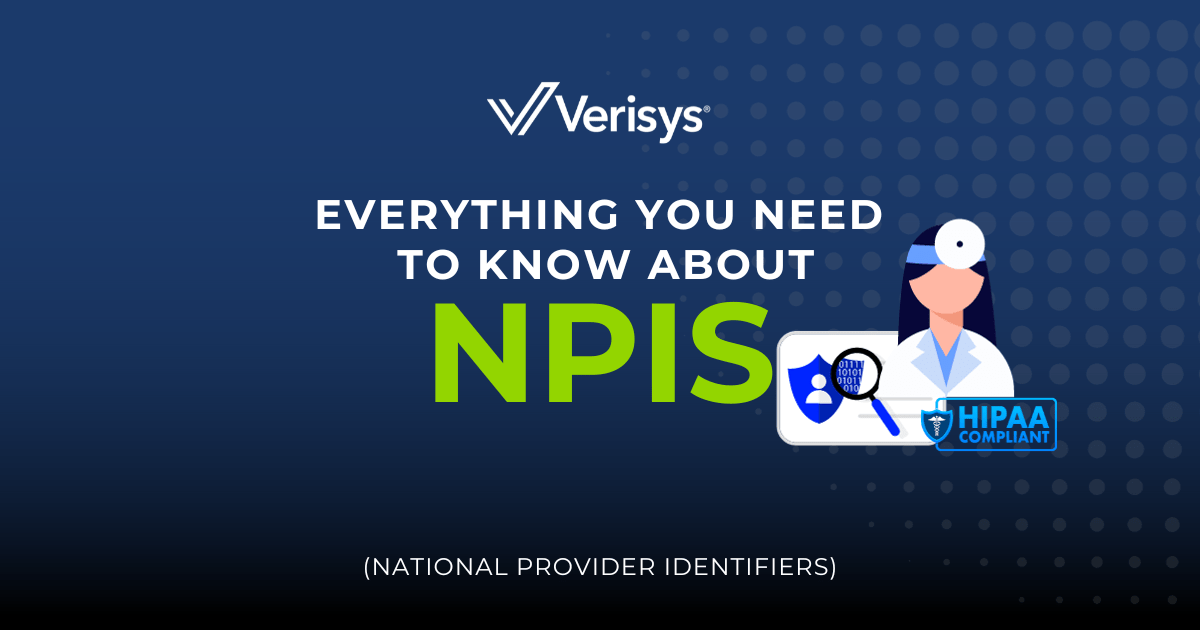– The best resource for monthly healthcare regulatory compliance updates. Compliance Updates: April 2024 Overlook: Licensure Compacts Other Legislation Board Updates Interstate Medical...


 What Are NPI Numbers?
What Are NPI Numbers? NPI (National Provider Identifier) numbers are 10-digit numerical identifiers that uniquely identify individual providers or healthcare entities. Providers, employers, health plans, and payers use these numbers for billing purposes.
CMS.gov The Administrative Simplification provisions of the Health Insurance Portability and Accountability Act of 1996 (HIPAA) required the creation of a standard, unique health identifier for healthcare providers, which the NPI satisfies. Now, all covered healthcare providers, health plans, and healthcare clearinghouses must use NPI numbers in HIPAA transactions.
NPI numbers are necessary because, before their implementation, health plans and federal payers used non-standard identification numbers for healthcare providers and suppliers, leading to complications in the claims submission process. The NPI Final Rule established the NPI as the standard for a unique health identifier, simplifying the claims process and reducing administrative burdens.
Providers must use their NPI when transmitting any electronic health information in connection with a transaction. The NPI improves the Medicare and Medicaid programs, other federal and private health programs, and the overall effectiveness and efficiency of the healthcare industry by simplifying administration and enabling the efficient electronic transmission of health information.
All individuals and organizations that meet the definition of healthcare provider as described in 45 CFR 160.103 and conduct HIPAA transactions or use health records must obtain an NPI. This includes health plans, health plan clearinghouses, and healthcare providers who transmit health information electronically, as well as healthcare organizations that transmit protected health information to covered entities that require it. Whether a HIPAA-covered provider, a healthcare provider, or a supplier who bills federally funded programs for services, an NPI is mandatory. Providers also need an NPI to enroll in Medicare.
NPI numbers come in two types: Type 1 for individual providers like sole proprietors, dentists, physicians, and surgeons, who are eligible for only one NPI, and Type 2 for organizations, which may include various healthcare facilities and incorporated healthcare providers.
The Centers for Medicare and Medicaid Services (CMS) began developing a healthcare provider identification system in July 1993, culminating in the establishment of the NPI as the standard in the NPI Final Rule published on Jan. 23, 2004. The NPI replaced the Unique Physician Identification Number (UPIN), which Medicare previously used as an alternative to the Social Security number for medical practitioners. The UPIN Registry ended in 2007 in favor of the standardized NPI.
National Provider Identifier (NPI) Replaced the Unique Physician Identification Number (UPIN)
The UPIN (Unique Physician Identification Number) was established by Medicare as an alternative identifier to the Social Security number for physicians and other medical practitioners. The UPIN Registry was discontinued in 2007 when CMS replaced UPINs with NPI numbers as the preferred provider identification number. This was done to standardize and simplify the claims submission process.
Healthcare providers and organizations can apply for an NPI number through the National Plan and Provider Enumeration System (NPPES) online or via paper form. The process is quick, taking about 20 minutes, with the potential to receive an NPI number in as little as 10 days.
Individual providers must first create a username and password through the Identity & Access Management System and log in to NPPES using those credentials.
Providers can also apply for an NPI number through a paper form or through an organization on their behalf. Complete instructions are found on the CMS website.
Since an NPI is required by HIPAA regulations to track healthcare services and reimbursement, health plans will reject any claim submitted without a valid, registered NPI.
Once an NPI is assigned, a provider’s NPI will not change. The NPI remains with the provider regardless of a job or location change.
The NPI does not replace other identification numbers such as a provider’s taxpayer identification number (TIN), Drug Enforcement Administration registration, license number, or Social Security number. However, it does replace all previous healthcare transaction, claims, and billing identification numbers. While health plans may use other numbers internally, the NPI is mandatory for HIPAA transactions.
The NPI does not replace numbers used for other identification purposes, including a provider’s taxpayer identification number (TIN), Drug Enforcement Administration registration, license number, or Social Security number. It does, however, replace all previous identification numbers that providers used for healthcare information transactions, claims, and billing. Health plans may continue to use other provider identification numbers other than the NPI internally, but the NPI must be used for HIPAA transactions.
There are many ways to perform an NPI lookup for a provider or an organization. The official NPI lookup website is the NPPES NPI Registry. This is a free service open to anyone. You can start with the NPI number or with a name. The search result includes the NPI number, the first and last name of the provider, the NPI type indicated with icons, primary practice address, phone, and primary taxonomy. The results are shown in the search result window and can be downloaded, or, alternatively, captured through an application programming interface.
Tracking actions to a standardized identifier provides transparency that can identify and impede fraud. Verisys uses the NPI as one of many data points when verifying provider identity for clients during the provider credentialing process.
Tracking actions to a standardized identifier provides transparency that can identify and impede fraud. Verisys uses the NPI as one of many data points when verifying provider identity for clients during the provider credentialing process.
 |
Written by Verisys Verisys transforms provider data, workforce data, and relationship management. Healthcare, life science, and background screening organizations rely on our comprehensive solutions to discover their true potential. Visit verisys.com to learn how we turn problems into power.
|